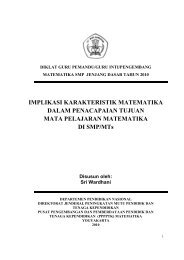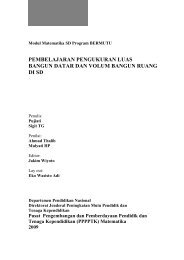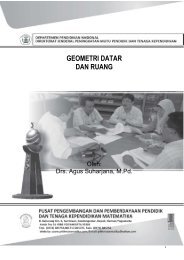25 Biggest Mistakes Teachers Make and How to Avoid Them
25 Biggest Mistakes Teachers Make and How to Avoid Them
25 Biggest Mistakes Teachers Make and How to Avoid Them
Create successful ePaper yourself
Turn your PDF publications into a flip-book with our unique Google optimized e-Paper software.
68 Teacher–Student Relations<br />
several strategies for teaching LEP<br />
children. Macias (1986) offers some<br />
strategies that are appropriate for this<br />
scenario; give clear directions, des -<br />
cribe tasks accurately, demonstrate<br />
<strong>and</strong> explain new information, pace<br />
SCENARIO 10.6<br />
Lesson in Oppression<br />
instructions, actively involve the students,<br />
<strong>and</strong> expect that all children will<br />
succeed. These basic tenets of effective<br />
pedagogy cannot be accomplished<br />
if the student is placed in the<br />
back of the room <strong>and</strong> ignored.<br />
My worst experience in education was undoubtedly in the fifth grade. We had just<br />
moved (again) <strong>to</strong> Montgomery, Alabama, <strong>and</strong> the year was 1962. Today I still have difficulty<br />
reminding myself of the horrors people put upon other people.<br />
The school was integrated but that didn’t matter because few blacks attended<br />
school there. Students or their parents had <strong>to</strong> purchase their own textbooks <strong>and</strong> worksheets,<br />
which excluded many from attendance.<br />
There was one black student, D., <strong>and</strong> even though he had no books, no shoes, he<br />
still tried <strong>to</strong> make it work. Many of the students actually helped D. or tried <strong>to</strong>, but in<br />
the end, the teacher failed him miserably. I can still see his face, choking back tears at<br />
the indignation heaped upon him by this supposed “teacher.”<br />
Overt racism is an insidious<br />
contaminant that befouls all<br />
that embrace it, encounter it, or just<br />
witness it. The author of this scenario<br />
witnessed man’s inhumanity <strong>to</strong> man<br />
through the teacher’s race-based ill<br />
treatment of another student. The<br />
teacher’s intent was <strong>to</strong> hurt or discriminate<br />
against the black student,<br />
not realizing that some of the white<br />
students would experience that<br />
hurt vicariously. A study done by<br />
Woolfolk <strong>and</strong> Brooks (1983) showed<br />
that teachers are influenced by a student’s<br />
physical appearance <strong>and</strong>, in<br />
some cases, may withhold smiles,<br />
approval, <strong>and</strong> eye contact, yet may<br />
readily disperse disapproval of students<br />
they perceive as less desirable.<br />
This teacher’s prejudices, biases, <strong>and</strong><br />
lower expectations for the black student<br />
obscured her view of his efforts<br />
<strong>and</strong> struggle <strong>and</strong> hardened her<br />
resolve <strong>to</strong> fail him. The long-lasting<br />
negative effects of her actions are evidenced<br />
in this author’s inability <strong>to</strong><br />
forget what happened.<br />
Effective educa<strong>to</strong>rs realize that<br />
they cannot let the way that they feel<br />
about children influence the way that<br />
they teach them <strong>and</strong> interact with<br />
them. This is a tall order <strong>to</strong> expect<br />
teachers <strong>to</strong> put aside their bias or<br />
prejudice <strong>to</strong>ward members of a<br />
group <strong>and</strong> treat them fairly. Prejudice<br />
is a learned behavior that is fostered<br />
by stereotypes <strong>and</strong> fueled by ignorance.<br />
The good news is that prejudice<br />
can be unlearned if teachers care<br />
enough <strong>to</strong> find out more about a<br />
particular culture, <strong>to</strong> embrace diversity,<br />
<strong>and</strong> <strong>to</strong> celebrate differences.<br />
Fortunately, some changes have been<br />
made for black students since 1962.





